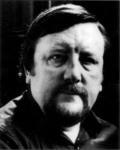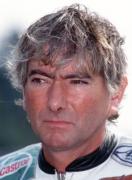|
|
||||||||||||||||||||||||
 |
Featured person
Recently added |
Robert Shaw (1931 - 1996): |
||||||||||||||||||||||

|
| Robert "Bob" Shaw |
Robert Shaw, always known as Bob, was generally accepted to be one of Ulster's internationally-acclaimed writers in the genre of science fiction.
Shaw, whose father was a policeman, was from Belfast, and grew up in a peaceful suburb, though he saw it as dreary, which was what he said stimulated his interest in science fiction. He was educated at a technical school until the age of seventeen, when he began an apprenticeship as a draughtsman at a structural engineering firm. He then joined the leading aircraft manufacturer, Short Brothers and Harland, in Belfast.
After the war, he enjoyed collecting American science fiction magazines in Belfast's Smithfield district, with its second-hand bookshops, the magazines originating from the large contingent of United States military personnel stationed in Northern Ireland during the Second World War. In 1950 he became involved with "Irish Fandom", the science fiction enthusiasts' group founded by Walter Willis and James White. Shaw was a regular contributor of a range of materials to one of its fanzines, Hyphen.
In 1954 he married a fellow member of "Irish Fandom"; in 1956 they moved to Canada where they remained for a decade, which saw something of an hiatus in Shaw's writing. Back in Belfast, he was science correspondent of the Belfast Telegraph from 1967-1970, then worked for Short Brothers and Harland but in 1973 emigrated to England, unhappy about bringing up a family in the then violent and uncertain political conditions in Northern Ireland. Initially he worked for Vickers, the shipbuilding firm, before turning to full-time writing; he would remain in north-west England for most of the rest of his life, writing prolifically, though with ocular health problems, amongst other ones.
He first published a story in a professional publication in 1951, in the New York Post; several others appeared in the magazines Nebula Science Fiction and Authentic Science Fiction. In 1954 he and Walter Willis published The Enchanted Duplicator (sometimes called The Magic Duplicator) which some saw as being based on Milton's Pilgrim's Progress, although the authors denied this. The duplicator of the story (familiarly referred to as a "duper") is an ordinary Gestetner cyclostyle copier, a vital tool for an amateur science fiction group in real life; which becomes an almost Holy Grail implement when following a world war in the 1960s (a decade in the future, that is) science and science fiction writers become a hated and hunted underground group. The story's "Tower of Trufandom", the name a barely-disguised reference to Shaw and his fellow fans, was based on Scrabo Tower, above Newtownards, County Down. (Many fans of CS Lewis identify Scrabo and its surroundings as the inspiration for Narnia in his religious allegorical children's fiction.) Apart from the occasional placename (Silverstream or Orangefield) there are no other references to Ulster in his work.
On his return to Ulster from Canada, he published Light of Other Days in 1966, which he later expanded into a novel, Other Days, Other Eyes in 1972. In these works he introduced his concept of "slow glass": glass through which light can take months or years to pass, thus allowing people to view the past as if in real time. This was described by his Independent obituarist as "one of the few really original ideas in modern SF". In all, he published 25 novels.
Shaw was known as a kindly, humorous and convivial man, popular at sceience fiction conventions, where he would hold forth with erudition, enthusiasm and wit. He was widowed in 1991, in 1993 he underwent major surgery for cancer; he remarried in the same year, and died in his sleep in February 1996.
| Born: | 31 December 1931 |
| Died: | 11 February 1996 |
| Richard Froggatt |
| Acknowledgements: Wesley McCann |
| Bibliography: http://news.ansible.co.uk/a104.html; The Independent obituary, 17 February 1996; Dictionary of Irish Biography |


Home | Our Policies | Plaques | Browse | Search | Sponsors | Links | Help | Contact
Privacy & Disclaimer | Cookie Policy | Site Map | Website Design By K-Point
© 2024 Ulster History Circle









